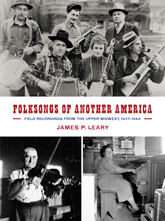Sound Salon – Folksongs from Another America: Lost Sounds from the Upper Midwest
Folksongs from Another America: Lost Sounds from the Upper Midwest

Talk and Screening with Author Jim Leary
Thursday, November 12, 6:30 pm
Room 126 Memorial Library
728 State Street
“As odd and singular as the stuff being made in Appalachia or the Mississippi delta.”—Los Angeles Times
Folklorists working for the Library of Congress in the mid-20th century recorded roughly 2000 folksongs and tunes in more than twenty-five languages from performers in Michigan, Wisconsin, and Minnesota. These remarkable songs and their singers have been largely unknown until now. Jim Leary, UW Professor of Folklore and Scandinavian Studies, will introduce his Folksongs of Another America: Field Recordings from the Upper Midwest, 1937–1946 (a book with 5 CDs and a DVD) recently co-published by the University of Wisconsin Press and music publisher Dust-to-Digital. Illustrated with sounds and images, the talk will sketch the interrelated fieldwork of Sidney Robertson, Alan Lomax, and UW’s Helene Stratman-Thomas in indigenous, immigrant, and working class communities around the region.
The talk will be followed by a screening of the publication’s accompanying 25-minute documentary film, Alan Lomax Goes North, co-produced with the American Folklife Center at the Library of Congress. The film combines digital restorations of Lomax’s silent color film and sound recordings to capture his 1938 fieldwork with Wisconsin lumberjacks and with Croatians, Serbs, French Canadians, and Finns in Michigan, including the Upper Peninsula.
UW’s Mills Music Library will display at the event key archival holdings that figured significantly in this project, and the University of Wisconsin press will have copies of Folksongs of Another America available for purchase and autographing.
This event is co-sponsored by the University of Wisconsin Press, Mills Music Library, the Center for the Study of Upper Midwestern Cultures, the Department of Comparative Literature and Folklore, the Mayrent Institute for Yiddish Culture, and Dust-to-Digital